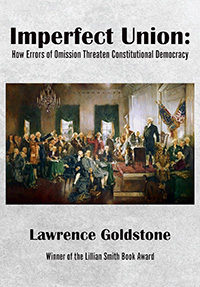 Imperfect Union: How Errors of Omission Threaten Constitutional Democracy
Imperfect Union: How Errors of Omission Threaten Constitutional Democracy
In this new and original study of the origins of the United States Constitution, award-winning scholar Lawrence Goldstone demonstrates that what was left out of the document by the Framers is of equal importance to what was included. Because of the deep divisions present in the United States at the beginning of the Republic, delegates to the Constitutional Convention in 1787 were unwilling, and often unable, to forge a plan for government that would be both comprehensive and sufficiently acceptable to competing interests to achieve ratification. Rather than risk rejection, they chose to leave many key areas of governance vague or undefined, hoping the flaws could be dealt with after the Constitution had become the “supreme law of the land.” Although successful in the short term, that strategy left the Constitution excessively prone to subjective interpretation and, as a result, the United States was rendered vulnerable to anti-democratic initiatives and the perpetuation of minority rule, both of which plague the nation today. Thus, a constitution drafted to ensure “a more perfect union” has instead begotten dysfunction and disunion. The ossification of America’s political process is to a significant degree due not to what the Constitution says but rather from what it fails to say. The only way to address the threat these omissions engender is to identify the flaws and then complete the Constitution by fashioning legislative solutions to fill the gaps.
“In this engaging and insightful book, Lawrence Goldstone shows how the Constitution, which Americans venerate so much, is incomplete and partial. Taking us on a tour of the text and our shared history under it, Imperfect Union shows how things the Constitution overlooks have sowed two centuries of dissension and today threaten to undermine our republic. Wonderfully written and thoughtfully critical, Imperfect Union is a valuable contribution to our understanding of how the Constitution works—and how it doesn’t.”
—Adam Winkler, Connell Professor of Law, UCLA School of Law, author of National Book Award finalist We the Corporations: How American Businesses Won Their Civil Rights
“Imperfect Union is a timely, important, necessary book that should be read by anyone concerned about the present state of American politics. Written in clear and lucid prose, it deserves the attention of, and discussion by, the widest possible audience. One does not have to be lawyer to grasp his arguments, just interest and concern about the future of our country.”
—Sanford V. Levinson, W. St. John Garwood and W. St. John Garwood, Jr. Centennial Chair and Professor of Government, University of Texas, Austin School of Law
“A superb job. Powerfully written and totally accessible, Imperfect Union gives unique insight into how today’s Constitutional crisis stems from the Framers’ unwillingness to confront issues that they knew to be threats to democratic ideals.”
—Judith Miller, Journalist, Adjunct Fellow of the Manhattan Institute, Contributing Editor, City Journal
